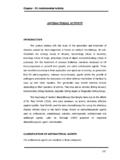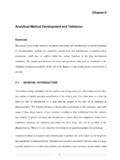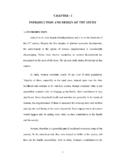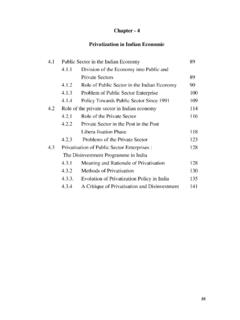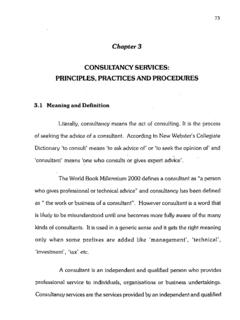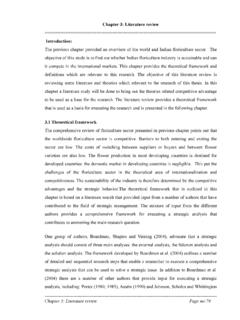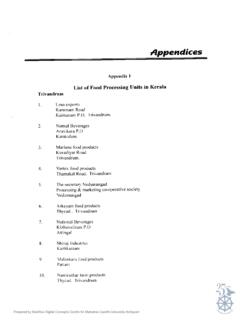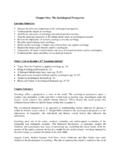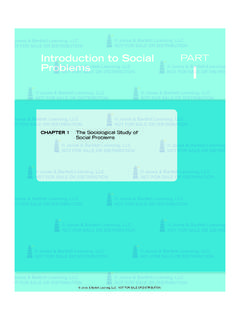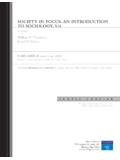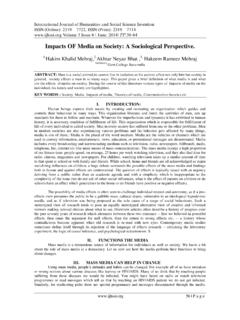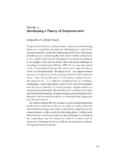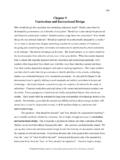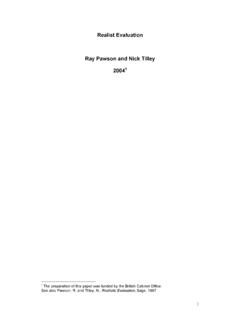Transcription of CHAPTER-2 DEFINITION, MEANING AND CONCEPT …
1 16 CHAPTER-2 DEFINITION, MEANING AND CONCEPT OF JUVENILE DELINQUENCY Introduction Children need love, especially when they do not deserve it. - Harold S Hulbert, child psychiatrist Prescribing different treatment for juvenile offenders is an offshoot of the new penology, which came to be applied with the realization the Courts. Erstwhile system exposed delinquents to contamination due to incarceration with other criminals. The nation s future citizens deserve compassion and best care. A child is absolutely born innocent but certain social and environmental factors in a negative aspect diverge their minds towards criminal tendencies, whose removal might mould them into a person of stature and excellence. We all know that Children are the assets and wealth of any nation. A healthy environment should be provided to all children so that they become civilized citizens who are physically fit, socially active and mentally conscious, equipped with all skills and active participation required by the society.
2 For reducing inequality and ensuring social justice an equal opportunities for development to all children should be given, which consecutively would work as an effective measure to prevent children from becoming delinquent in any society. There is a general attitude towards children to behave obediently, show respect towards others and imbibe behaviour having high moral values but due to various circumstances children are being diverted from social and general command. Recently, juvenile delinquency has become an important aspect of criminology. Juveniles have got serious forms of delinquent behavior which may hamper the stability and social command of our society. The deviant 17 behavior of the juveniles has created social disorder and destruction of moral values which is creating an alarming position in organized society. The word delinquency has its origin from the Latin word delinquere which MEANING de away and linquere to leave thus, mean by to leave or to abandon.
3 Initially, the word was having primarily MEANING and applied to those parents who have abandoned and neglected their children. Now days, it is applicable on all those children who are involved in illegal and harmful activities. Juvenile is considered as a child who has not completed a specific age as mentioned in the law of any country and doesn t bear resemblance as an adult person and who can be made legally answerable for his criminal activities. The juvenile is a child who has alleged violated certain laws which declares his act or omission as an offence. A juvenile and a minor are used in different perspective in legal terms. The term juvenile is generally used in reference to a young criminal offender and minor is related to legal capacity of a In United States of America, every state has the authority or jurisdiction to determine the age of juveniles who is living within its own territory or jurisdiction; because in the USA different states have different age criteria with regard to offence committed by the juveniles.
4 But most of the states concur with maximum age set in the standards Under federal govt., a person under the age of 21 years can be considered as juvenile delinquent for committing any offence but in some other States age limit is under 12 years or under 18 years. In majority of the States there is no lower age limit set for litigating child as a delinquent, in the Mississippi it is 10 and in the New York it is set as 7 years . Definition of a Juvenile 1 See the Black Dictionary of Law. 2 Standards and , Standard 18 In India, before passing of the Children Act, 1960 there was no consistency regarding age limit of juvenile delinquent. Bombay Children Act 1948 defined Child means a boy who has not completed the age of 16 years or girl who has not completed the age of 18 years 3. The Children Act defined Child as a person under the age of 16 years.
5 Under the Children Act 1920 Child means a person under 14 years and when used to reference to sent to certified school applies to that child during while period of detention notwithstanding that the child attains the age of 14 years before expiration of that period .4 The Saurashtra and West Bengal defines a Child as a person who has not attained the age of 18 years . Haryana Children Act has also maintained this difference in defining child as a boy who has not attained the age of 16 years and a girl who has not attained age of 18 years 5. Juvenile Justice Act, 1986 defines a juvenile or child, who in case of a boy has not completed age of 16 years and in case of a girl 18 years of age . Government of India while discharging its international obligations revoked the JJA Act, 1986 by 2000 Act and the distinction regarding the age between male and female juveniles was done away. According to the new law, age of juvenile for both male and female involved in conflict with law has been fixed at 18 years.
6 A juvenile in conflict with law under the JJ (C & P) Act, 2000 is a juvenile who is alleged to have committed an offence but has not completed 18 years of age on the date of commission of said offence . And under the Juvenile Justice (Care and Protection) Act 2015 juvenile defined under (35), juvenile means a child below the age of eighteen years . Definitions of Delinquency Delinquency is unwelcomed action, omission or moral behaviour of a juvenile which is socially not permitted in any society. Generally it means that if the child fails to meet certain social obligations anticipated from them by the 3 The Bombay Children Act, 1948, Section 4. 4 The Andhra Pradesh Children Act, 1951, Section 2(d) 5 The Haryana Children Act. 1974, Section 2 (d) 19 people, then he is considered to be delinquent. The juvenile delinquent is behavioral disorder which is generally defined as a child trying or pretending to act like a grown up or adult.
7 The action of the child can be seen as a childish foolish behaviour but it can cause serious worry and concern. There is a very blurred distinction between a delinquent child and a normal child and his behaviour to anxious person is the deciding factor among a cheerful act and delinquency. Generally there is a haze of ambiguity and confusion surrounding delinquency and there is no single general acceptable definition for it. The first ever legislation on juvenile delinquency, passed by the State of Illinois in l899 which specifies various specific kinds of delinquency in addition to the offences covered by the criminal According to some social workers, delinquency consisted of socially unaccepted acts . And a psychiatrist suggests that delinquent behaviour is activity which deviates from the normal . And a lawyer would say juvenile delinquency is what the law says it is . According to Sheldon, it is behaviour disappointing beyond reasonable expectation.
8 Cyril Bur7 says that delinquency occurs in a child when his antisocial tendencies appear so grave that he becomes or ought to become the subject of official action . And in the words of Robison Holt8, we use the term delinquent as we sometimes use the term love as though it were a simple CONCEPT whereas it actually embraces complex patterns of behaviour. Delinquency is now become clear to many peoples. It is believed that delinquency is considered in a child only when his behaviour is harmful for others and is occurring repetitively. Frederick B. Sussmann presented a list of acts or conditions included in delinquency definition as violation of any law or ordinance, habitual truancy, association with thieves, vicious or immoral persons, and incorrigible beyond control of parent or guardian and so on . Edwin Powers and Helen Witmer found in their study that in order to define the real delinquents it was necessary to take into 6lll.
9 Rev, Stat. C. 23; see also Cavan, Juvenile Delinquency,15 7 The Young Delinquent 15 (1925) 8 Juvenile Delinquency 10 (1960) 20 consideration three concepts or criteria namely, the seriousness of the behaviour, its frequency and the attitude of the offender toward a lawfully constituted society . In view of that, the classification of the delinquents is done into five major sects most, ordinary, occasional, seldom and least delinquent. Therefore the term delinquency does not have a predetermined MEANING . On the other hand, the sociological and the legal are generally two accepted approaches for the interpretation of the term. The sociological approach gives a liberal interpretation to the term delinquency. This view is well expressed by the definition given by Clyde B. Vedder who says, juvenile delinquency refers to the anti-social acts of children and of young people under age.
10 Such acts are either specifically forbidden by law or may be lawfully interpreted as constituting delinquency, or as requiring some form of official action . It means deviation from the normal behaviour. According to Robison9 the legal term delinquency is an umbrella for a wide variety of socially disapproved behaviour that varies with the time, place and the attitudes of those assigned to administer the law . This behavior of delinquent may include some acts such as disobedient behaviour, bunking schools, truancy and incorrigibility, frequently going to the cinema halls, going to places of ill reputation and coming home late at night. In brief, delinquency described on a sociological aspect is a child whose behaviour is not as per statue and is alarming to his parents, neighbors and teachers and to those who are responsible for his care, protection and education10. The universal MEANING of the word Delinquency is something not correct which is against the social norms of a society.
